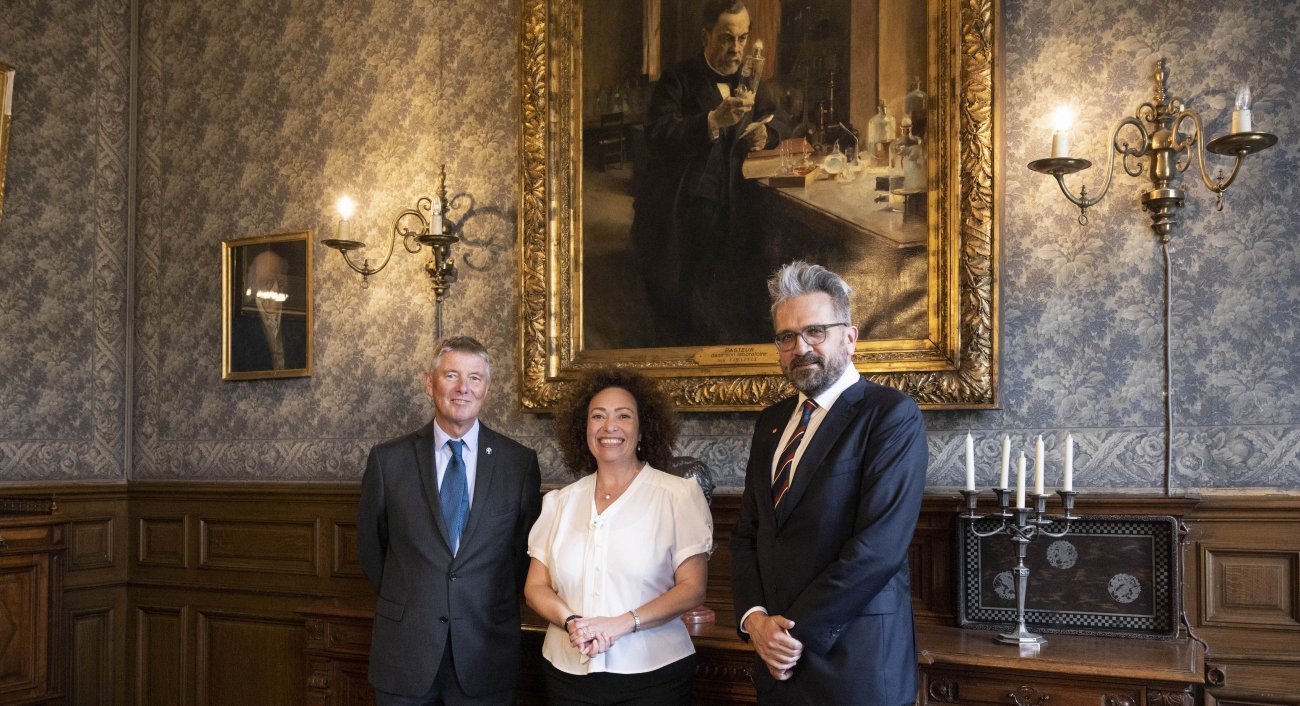Two Academic and Scientific Heavyweights Agree to Implement Joint Actions Towards the Creation of a Center of Excellence in Emerging Infectious Diseases with Planned Operations/Locations in Paris and San Francisco.
In a ceremony on October 21, 2022, the Institut Pasteur and UC San Francisco Quantitative Biosciences Institute (UCSF QBI) announced a new partnership for the joint establishment of the Institut Pasteur-UCSF QBI Center of Excellence in Emerging Infectious Diseases with planned operations in San Francisco and Paris. The MOU was signed by Professor Stewart Cole, President of the Institut Pasteur, Professor Sam Hawgood, Chancellor of UC San Franciso and Dr. Nevan Krogan, Director of Quantitative Biosciences Institute at UCSF.
The mission for the Center will be multifaceted:
- Pandemic preparedness: prediction and treatment
- Collection of data from worldwide cohorts for epidemiology and prevention of infectious and neglected tropical diseases, both internationally and domestically
- Increase the capacity and research capabilities of southern countries in pandemic preparedness through exchange program
- Deeper understanding of the effects of global warming on infectious and neglected diseases
Professor Carla Saleh, co-scientific lead of the partnership and Principal Investigator, Viruses and RNA Unit, Department of Virology at the Institut Pasteur said, “With global warming and an increase in infectious diseases, pandemic preparedness is more important now than ever. Our collaboration with QBI and QCRG during the COVID pandemic proved highly successful. We look forward to furthering our collaboration and bringing the unique strengths of each of our organizations to not only rapidly respond to global infectious disease challenges, but also focus our efforts on preemptively addressing matters that have potential to become pandemic.”
The agreement calls for the Institut Pasteur and UCSF to work together to train scientists, compete for sponsored research funding and attract philanthropy.
“I commend the researchers at UCSF and the Institut Pasteur, as well as other scientific partners across the globe for coming together at a crucial time in the pandemic,” said UCSF Chancellor Sam Hawgood, MBBS. “This highly collaborative initiative serves as an example of how team science can contribute in a global health crisis. We look forward to more collaborative work in the future.”
“The Institut Pasteur has a long history of combating global health crises, such as HIV/AIDS, Chikungunya and Zika, and the strong partnership established spontaneously with UCSF QBI in response to the Covid pandemic was exemplary in this regard,” says Professor Stewart Cole, President of the Institut Pasteur. “The long-term agreement signed today formalizes the partnership and will accelerate and intensify further collaborations.”
Nevan Krogan, Ph.D., co-scientific lead of the partnership, founder of QBI’s Coronavirus Research Group (QCRG) and director of QBI added, “The newly formed collaboration between UCSF QBI and the Institut Pasteur serves as a prime example of two leading scientific institutions joining efforts and resources today in anticipation of future needs for infectious disease threats.”
In 2020 with COVID-19 spreading rapidly around the world, Krogan, who is also a senior investigator at Gladstone Institutes, joined forces with senior scientists at the Institut Pasteur and other researchers around the world, including at Icahn School of Medicine at Mount Sinai, and Howard Hughes Medical Institute, to try to find a treatment for a novel pathogen. The team was the first to extensively map the protein-protein interaction landscape of SARS-CoV-2 (Gordon et al., 2020) and has since published more than 50 studies.
Utilizing its groundbreaking research, QBI, the Institut Pasteur and other international collaborators were the first to mechanistically review existing drugs and compounds across the medical landscape, leading to the rapid discovery of 69 agents, which was subsequently expanded to include 97 compounds that have an impact on the identified human proteins. This breakthrough approach to identify and evaluate the therapeutic efficacy of a wide range of existing therapeutics in a new disease area enables rapid and focused selection of drugs and compounds directed at proteins critical for disease progression (White et al., 2021). Going directly to the chemistry of how drugs interact with the biological target has the potential to lead to faster treatment of patients in a pandemic - where time is paramount - with the drugs with greatest therapeutic potential, either existing or in development.
Directly following the partnership signature, Professor Stewart Cole, President of the Institut Pasteur, presided over a Legion of Honour ceremony for Nevan Krogan, decorating him with this prestigious award.

Pr Stewart Cole, Pr Carla Saleh and Dr Nevan Krogan, on October 21st, 2022 at the Institut Pasteur
© Institut Pasteur - François Gardy
For more information on the collaborative scientific discoveries about Covid-19:
April 2020, Revealing how SARS-CoV-2 hijacks human cells; points to drugs with potential to fight COVID-19 and a drug that aids its infectious growth:
https://www.pasteur.fr/en/research-journal/press-documents/revealing-how-sars-cov-2-hijacks-human-cells-points-drugs-potential-fight-covid-19-and-drug-aids-its
October 2020, Team of international scientists identify common vulnerabilities across SARS-CoV-2, SARS-CoV-1 and MERS coronaviruses:
https://www.pasteur.fr/en/press-area/press-documents/team-international-scientists-identify-common-vulnerabilities-across-sars-cov-2-sars-cov-1-and-mers
June 2021, Drug repurposing to counter COVID-19: antiviral activity may be induced by phospholipidosis:
https://www.pasteur.fr/en/press-area/press-documents/drug-repurposing-counter-covid-19-antiviral-activity-may-be-induced-phospholipidosis


